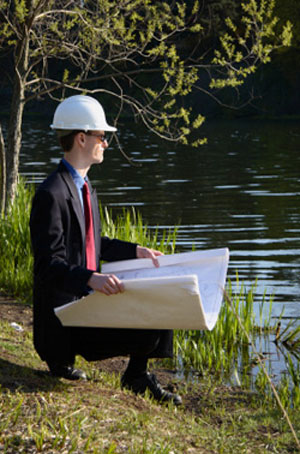Environmental Engineer
Tasks & duties

Environmental engineers may do some or all of the following:
-
visit the sites to be worked on
-
test and assess the sites
-
give advice and discuss options with clients
-
design and make drawings of proposed works, structures or repairs
-
use computer models to look at various environmental processes
-
carry out feasibility studies and write reports
-
meet clients to discuss plans and gain clients' approval
-
consult the community, local iwi, councils and other professionals in the building construction industry
-
gain resource consent for the proposed structures or repairs
-
supervise the contractors carrying out the work
-
manage projects from start to finish
Skills & knowledge
Environmental engineers need to have:
-
knowledge of civil engineering
-
knowledge of complex chemistry in natural and engineering processes
-
knowledge of relevant legislation such as the Resource Management Act, the New Zealand Building Code, local by-laws and town planning regulations
-
knowledge of physics and maths
-
skill in analysing and interpreting information such as client requirements, plans and designs
-
problem-solving skills
-
planning and organisational skills
-
good communication skills
-
writing skills for producing reports
Environmental engineers also need good computer skills because they specialise in Geographic Information System (GIS) computer modelling to do such things as analyse stormwater and river flows.
Entry requirements
To become an environmental engineer you need a Bachelor of Engineering. A Diploma in Engineering (which has replaced the New Zealand Certificate in Engineering) or an equivalent diploma may also be acceptable.
Secondary education
To enter tertiary training Bursary or NCEA equivalent English, maths with calculus, physics and chemistry is preferred.
Training on the job
Skills are gained on the job. Environmental engineers may attend courses, seminars, workshops and conferences to keep their skills up to date.
Environmental engineers may apply to the Institution of Professional Engineers New Zealand (IPENZ) to become a chartered professional engineer (CPEng) after:
-
completing relevant qualifications
-
gaining appropriate work experience (usually four to five years)
-
completing a practical competency assessment
To maintain registration, chartered engineers need to demonstrate their ability to practice and display evidence of undertaking professional development at least every five years.
Registration
Environmental engineers should be registered with the Institution of Professional Engineers New Zealand (IPENZ).
Useful experience
Useful experience for environmental engineers includes draughting, surveying or engineering work. Studying wastewater or water treatment, environmental science or environmental management at university is also useful.
Related courses
Building Science and Technology
Construction Engineering
Environmental Engineering
Environmental Health
Water and Sanitary Engineering
Document Actions
